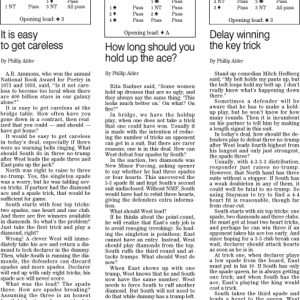Ask Carrie
Browse MoreDescription
Dear Readers: The widespread impact of the novel coronavirus has everyone on edge. And while the health and safety of our families and communities is the top concern, I’ve been hearing from many of you who are taken aback by the resulting market turmoil, and the speed and breadth of the decline.
Seeing your portfolio balance drop overnight is worrisome for any investor, especially for newer investors who have only seen the market rise, and for older investors who are near or in retirement. But before you panic, remind yourself that shock and surprise are hallmarks of the stock market. How long will this last? Will things get much worse before they turn around? What’s next? No one knows for sure, but there are positive things you can do to keep your investments on track and help you stay cool, calm and collected.
1. Stick to your plan.
The urge to do something — anything — can be overwhelming. The problem is you often wind up making things worse, either by selling too low immediately after a market downturn and missing out on future gains, or by chasing performance after markets take off. Often, the best strategy is to do nothing. This is where having a plan really pays off.
A plan reminds you of why you’re investing and goals that are important to you. A good financial plan is also strategic but not written in stone. As your goals and situation change, your strategy evolves. Modern financial plans often use advanced computer simulations to allow you to evaluate probabilities of different “what if” scenarios including the impact of stock market corrections and other life changes on your goals.
Don’t have a plan? It’s not too late. You can create one on your own, or better yet, contact an advisor to review your situation.
2. Keep things in perspective.
Even with the recent declines, investors are still up from the bottom of the great financial crisis in March 2009. Keep in mind that the higher the market, the smaller percentage a large point drop represents. How much a drop in the market will impact you depends on your overall investment allocation and where you are in relation to your financial goals.
Remind yourself of your long-term goals. Not looking at your portfolio too frequently can actually help. While you may be able to look at your investments at any time, it’s often a good idea to match your “look interval” with your investment time horizon.
To put this another way, if you’re trying to lose 20 pounds in a year, weighing yourself every hour — in grams — is counterproductive and frustrating. If you have a balanced portfolio that is lined up with your risk tolerance and time horizon, looking at your retirement account daily isn’t necessary and can cause unneeded stress. For most people, quarterly or annual reviews should be sufficient.
3. Don’t time the market.
People instinctively want big gains without having to bear losses. However, trying to avoid the pain of losses can lead people to not taking enough risk, indiscriminate selling, or holding on to a risky or losing investment for too long. These types of behaviors can have all sorts of negative consequences, from not being able to reach your financial goals to a large tax bill.
Attempts at “getting out” or “getting in” at the right time — known as market timing — can easily backfire. As we’ve seen, markets can march along steadily for long periods of time and shift — up or down — with blinding speed.
Rather than trying to time the market, base your investment strategy on the twin pillars of asset allocation and diversification. Your asset allocation (the way you divide your investments between different asset classes such as stock, bonds and cash) should reflect your willingness and need to take on risk. Diversification adds another level of control because all of your holdings will likely not go up and down at the same time, or at the same level. This means that at all times, some parts of your portfolio will likely be doing better than others.
4. Ignore (or at least filter) the noise.
There is a tendency to be easily influenced by recent news, events or experiences. Admittedly, it’s hard to tune out the racket of 24/7 market news. But this can lead to unnecessary or erratic trading and cause you to stray from your plan.
Take time to ask questions and fact-check sources. Adopt a broad view of your situation. Working with an advisor can often help you discover another point of view and point to strategies and options you may not have considered.
5. Focus on what you can control.
The reality is that markets are constantly changing. And while the stock market has gone up over the long term, it’s anybody’s guess what it will do in the short term.
You can’t predict or control the market. But you can control how you manage your investments, your savings rate, having a financial plan and how you react to events.
I can’t tell you how long a market decline will last. No one can. What I can tell you for certain is that following these five steps will increase the odds of reaching your long-term financial goals — and getting a better night’s sleep.
Carrie Schwab-Pomerantz, Certified Financial Planner, is president of the Charles Schwab Foundation and author of “The Charles Schwab Guide to Finances After Fifty.” Read more at http://schwab.com/book. You can email Carrie at askcarrie@schwab.com. The information provided here is for general informational purposes only and is not intended to be a substitute for specific individualized tax, legal or investment planning advice. To find out more about Carrie Schwab-Pomerantz and read features by other Creators Syndicate writers and cartoonists, visit the Creators Syndicate website at www.creators.com.
DIST BY CREATORS SYNDICATE, INC. (#0320-0ATT)






Reviews
There are no reviews yet.